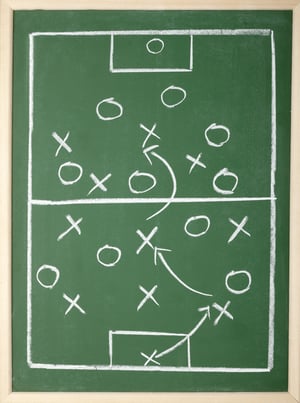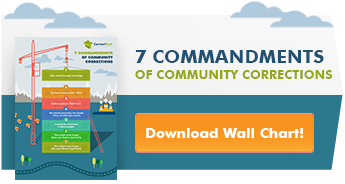 What a powerful statement made by Dr. Ed Latessa while speaking about what works and doesn’t work in reducing recidivism at the OCCA conference in May of 2018. Of course, you need referees in a game and metaphorically when running a community corrections program. We must play by and enforce the rules, but coaches win games and make their players successful. Community corrections does need staff that “blow the whistle” when clients go out of bounds, give appropriate consequences and redirection, but that alone only keeps people in bounds during the game, it doesn’t teach them how to improve their skills and improve long term. In my experience, Dr. Latessa is dead on. Staff naturally gravitate towards being the rule enforcer rather than the encourager. Getting staff to take on coach as their primary role is something that can’t just be trained, it must be immersed in the daily culture of the program.
What a powerful statement made by Dr. Ed Latessa while speaking about what works and doesn’t work in reducing recidivism at the OCCA conference in May of 2018. Of course, you need referees in a game and metaphorically when running a community corrections program. We must play by and enforce the rules, but coaches win games and make their players successful. Community corrections does need staff that “blow the whistle” when clients go out of bounds, give appropriate consequences and redirection, but that alone only keeps people in bounds during the game, it doesn’t teach them how to improve their skills and improve long term. In my experience, Dr. Latessa is dead on. Staff naturally gravitate towards being the rule enforcer rather than the encourager. Getting staff to take on coach as their primary role is something that can’t just be trained, it must be immersed in the daily culture of the program.
Coaching the Coaches
It’s funny because in most professions, medical especially, research and education drive practice and treatment. You rarely hear a doctor say, well I was taught that this is the correct way to treat this disease, but…I think this will work better – let’s do this instead. In mental health and community corrections, you still find staff that know better than what research and training has told them works, because, well, their gut tells them what the right way is.
“I understand what the assessment is saying but I know my client and what will work”
“I don’t get a cookie every time I do my job right, why should clients get something every time they do what they are supposed to”.
“If you don’t want to go to prison, don’t use drugs”.
Simple right? I get it, this is a field where staff are tested, pushed and manipulated as part of the daily routine. Emotions are hard to control, and we often only use our own experiences to form empathy and understanding. Some struggle to understand addiction if they haven’t experienced it personally or second hand. Some staff struggle to understand not following a rule just because it’s the right thing to do. Some staff struggle to see the parallel between them failing to follow a policy and the client failing to follow a rule.
So, what do we do? We coach the coaches.
 Get out of the Classroom
Get out of the Classroom
In my experience, we tend to train in a classroom and then assume everyone gets it. Get out of the classroom! A cook may read a recipe, but they really learn cooking in the kitchen. A surgeon goes to medical school, but they really learn when they practice. You cannot train on concepts such as coaching, motivational interviewing, positive reinforcement and then expect staff to just start doing it (the same way you cannot just tell a client – stop using drugs and consider them cured). The front-line operations staff, case managers and PO’s have the most contact and interaction with the clients and the most opportunity to do in the moment treatment and coaching for all those dosage hours that we know are needed.
Programs must have a designated coach to help staff practice the skills they are learning – do they really understand what was trained on? Don’t let supervisors off the hook. Shadow with them too. Being a supervisor doesn’t make you a super coach or a super motivational interviewer – if they aren’t doing it right, neither will their staff. Practice how to be a coach, use motivational interviewing, use reinforcement. Shadow them on the job and give direct feedback. Ask them what they could have done differently in certain interactions – they probably know. Did they miss an opportunity for reinforcement? Did they miss a coaching moment and instead lecture or give advice? How will they know this if no one tells them? How will they see that EBP techniques can work if they never really use them (or don’t use them with fidelity)?
If you say something is important, if you really want it to be important and only talk about it once a year, once every few months…well it’s not important. If you find your program is heavy on referees, work on developing your coaching staff, you just may find your team winning more games.
Want to learn more about coaching in community corrections? Check out our blog series on a Coaching Habit.


